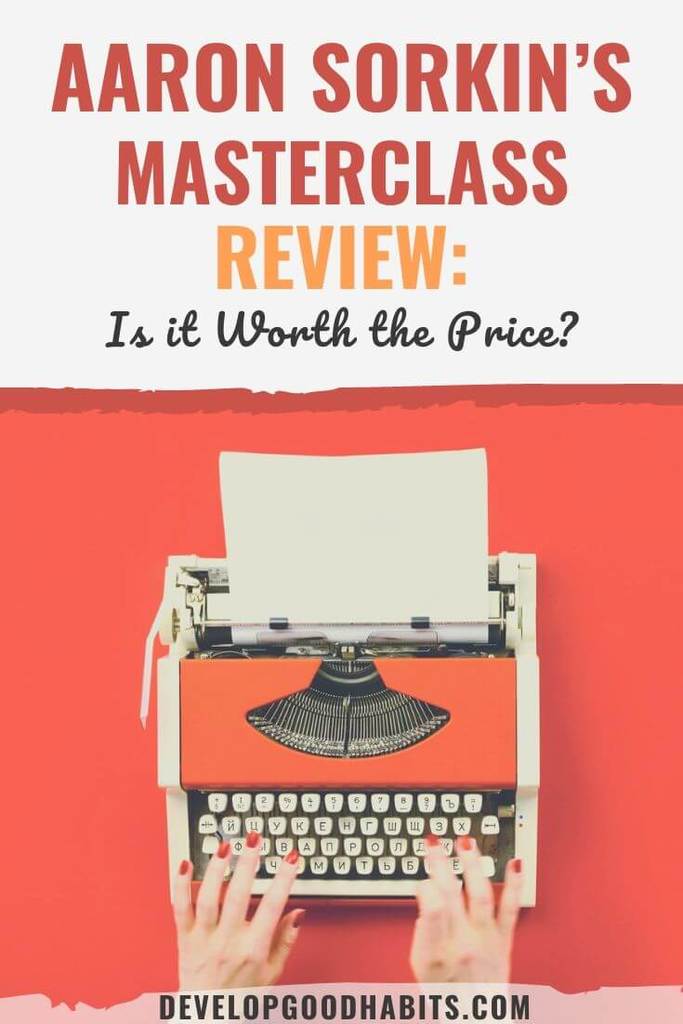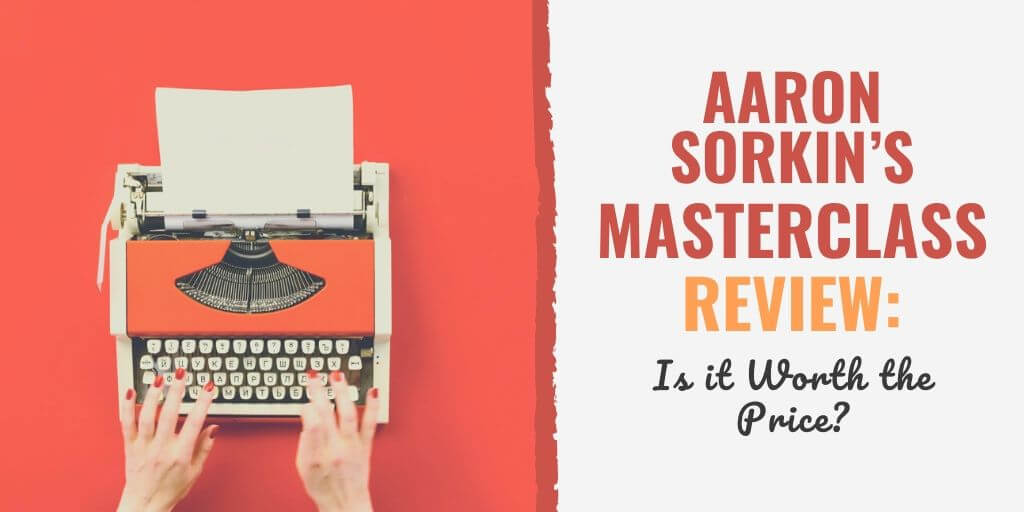There might be affiliate links on this page, which means we get a small commission of anything you buy. As an Amazon Associate we earn from qualifying purchases. Please do your own research before making any online purchase.
I’m sure most of you have heard of the website offering online classes taught by famous people, called Masterclass.
If you haven’t, read my recent review of the site here.
It’s definitely worth a gander. And with a 30-day money back guarantee, the site is worth a shot if you’re interested in… um, just about anything.
Writing. Music composition. Acting. Cooking. Art. Photography. Skateboarding.
If you have an interest in perfecting your craft or hobby… there is a good chance Masterclass offers it.
Today, though, I’m going to hone in on Aaron Sorkin and his Masterclass course.
Sorkin is the screen writing genius behind such films as A Few Good Men, The Social Network, Steve Jobs, Moneyball, Newsroom and The West Wing.
In this Aaron Sorkin Masterclass review, I will provide:
And since time is money, let’s get down to business.
Aaron Sorkin’s Masterclass Lessons: A Detailed Look
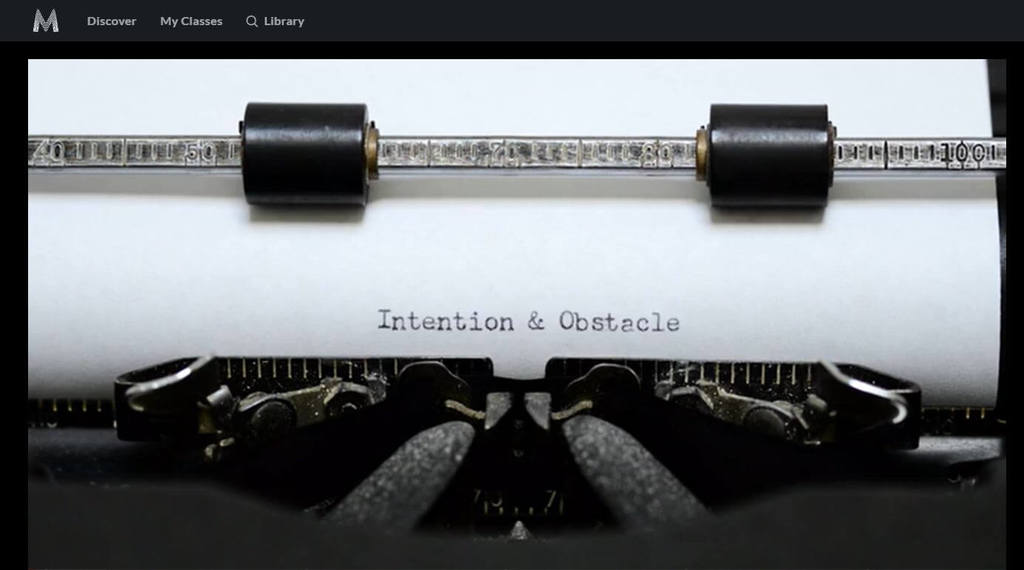
Lesson: Intention and obstacle
Sorkin needs intention.
Sorkin needs obstacle.
Sorkin is drama.
The first and most important lesson Sorkin offers is one of intention and obstacle. In fact, he drives this point home over and over again throughout the course because it is what he believes good dramas are built upon.
“It’s much harder to walk out of a bad movie than change the channel on a tv show. You’ve got to keep your audience interested, invested, hooked.”.
Supporting characters. Setting. Conflict.
These things are all built around the main character's intent… and the obstacles he must overcome in order to reach their goal.
It is what drives them… and what audience members can relate to.
Lesson: Story Ideas
A writer needs to know what an idea is… then they have to have it.
An idea isn’t “I want to write about ___”.
Instead, Sorkin believes you don’t actually have an idea until you can use the words: but, accept, then, etc…. The idea has to be going someplace and have roots.
You also have to find conflict. Drama.
Again, drama.
That is the only way of figuring out if an idea is good enough to commit to.
Sorkin compares himself to being a batter who is eyeing up a pitch worth swinging at.
He also admits that he never felt comfortable writing Newsroom, the popular HBO series… but loved the pitch.
That being said, he has also never once written something and wished he could take it back and make it better.
“If it’s a place you are attracted to… that’s a tv series,” states Sorkin.
“If the characters metaphorically speaking die at the end of the story, if there is no more story after that, then it’s a feature.”
Throughout the entire course, Sorkin suffers no shortage of thought provoking one-liners.
Like when he equates agreeing to a project, without having a complete idea, to a blind date… saying there is enough in some pitches to make him feel he could fall in love. Something he can work with.
New writers can start with a broken plot… take a short story you love and dramatize it. Not everybody is like Quentin Tarrantino, who Sorkin suspects was born with a head full of plot ideas.
Example Case Study: The American President:
Script was 385 pages long and Annette Benning was introduced until page 110. Was way too long. So he took out the story of the lobbyist to build the movie around, saving 100 or so pages for West Wing script ideas instead.
I don’t know why I found this so interesting, but I did. Maybe because it showed the imperfect process that is screenplay writing… and how sometimes the best ideas are those buried in the false leads.
Or at least that is what I took from it.
Lesson: Developing Character Part 1 & Part 2
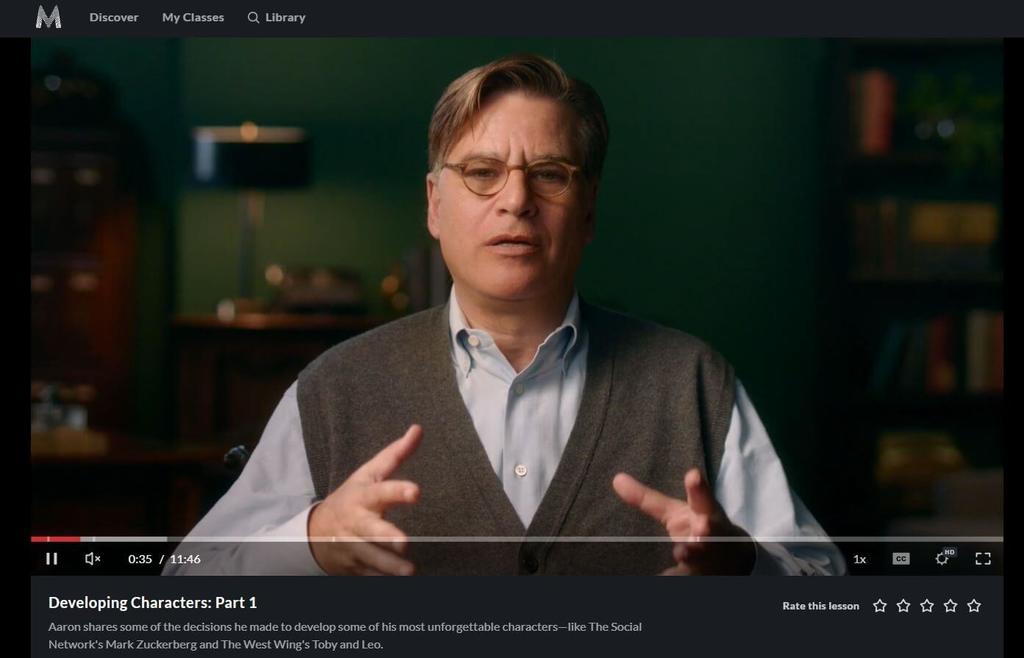
Sorkin begins Part 1 of the lesson by adamantly stating he has no characters in his head.
Instead, they are born from the intention and obstacle… the drama in his head. And the tactics being used to overcome that obstacle is what the character will be. Who they will be.
Sorkin references Social Network and Mark Zuckerberg’s blog posts from the night he invented “Face Mash”.
The blog post was Sorkin’s inspiration for the movie… the place where he could imagine what happened before the angry post by Zuckerberg.
The obstacles lying between Zuckerberg and his intention fed the movie.
Part Two of the lesson focused more on a new writer’s tendency to write long biographies to develop a character. Sorkin lectures that this never works and is rarely relevant.
The character only gets to be five years old if they say, “When I was five years old, I saw…”. Otherwise it never happened, as far as the audience is concerned.
Listing character traits will not come in handy either, he says. “You’re doing it out of obligation, thinking they will seem more human if you list more characteristics.”. But too large a list can be inhibitive, so he pleads with us to put the legal pad aside.
He ends the lesson by encouraging new writers to write characters unlike themself. To put people in your writers room who know who you are trying to write and argue viewpoints. That will make a character interesting and seem multifaceted.
One should also identify with his antiheroes and make sure the character has at least a few traits you can respect and relate to.
Finally, keep casting in mind. Actors will finish the character and how the audience perceives them.
Lesson: Research
There are two types of research: specific and unknown. Easy vs. hard. If you aren’t quite sure where you want your story to go, or what you want it to be, you need to investigate to find what it is you’re looking for.
“Talk to people… you never know where your next story is coming from. It’s a standing jump and you need to start from somewhere,” he says.
Interview skills is something else you need to craft. Need to cultivate trust and compassion, establish a relationship until you can ask the hard questions. “Tell me something I don’t know.”.
Meaningless research is usually subjective. What one person may find a waste of time, you may find critical to where you want your story to go.
But if the audience can’t see or hear it, there is no point in including it.
Also, don’t let your actor spend hours every day in an operating room overserving surgery just because he’s playing a surgeon on screen… you aren’t going to ask him to actually operate.
Lesson: Incorporating Research
Here, Sorkin discusses fitting discoveries into your writing.
If something really happened, it has to go in the script. But do you know what it means? Do you want the audience to know what it means?
As a writer, you have an inner moral compass if you’re writing a nonfiction piece.
“If you are telling a true story, you are not going to do something that would hurt the subject… especially if they are alive. Nor will it change the fundamental truth of what’s happening in the story.”.
For instance, if he wanted to change the fact that his main character was drinking a beer by substituting it with vodka, would it hurt anything? Likely, no. But if he were to interchange beer for cocaine… it would damage the character's credibility.
Lesson: The Audience
“Your audience is a component in the event.”.
They want to participate. They want to feel like they have a clue as to what is going on.
Don’t lose the audience!
9 times out of 10, your audience has some grasp of what you are saying… so you could never have a scene, for instance, where someone pulls out a gun in the Oval Office because we all know that could never happen. Your events have to be believable, even if nearly impossible.
If you lose the audience, it’s hard to get them back.
Did the audience understand it? Was their confusion? If there is, the story won’t work. You will lose sight of the target.
Lesson: Rules of Story
To understand a story, you need to understand the parts. The rules.
Sorkin suggests picking your favorite movie and finding the screenplay for it online. Then watching the film with the pages in your lap to see how it really translated. There is usually an obvious connector.
Sorkin credits Aristotle’s Poetics as “the rulebook” for art.
“Rules are what make art beautiful… rules make sports beautiful. If you were allowed to pick up a soccer ball and run across the field to throw it at the goalkeeper’s head, it wouldn’t be beautiful.”
The rules make it beautiful.
Similarly, the rules make writing beautiful.
The rules of drama are the only ones worth a grain of salt. He attests, you can write a story about anything or anyone, but maintaining the rules of drama are the only way to ensure its success.
Honestly, this lesson isn’t very relevant unless you’ve read or care to read Aristotle’s book… but I’ll let Sorkin slide here.
Lesson: Film Story Arc
In this lesson, Sorkin explains the story arc by noting the differences between story and drama.
Fact: The Queen died.
Story: The queen died and the king died of a broken heart.
Drama: The queen died. The king is alone. The queen was the brilliant one and now the king has to protect his position against people wanting to take advantage of his lack of intelligence.
A story is just a standalone idea until you can incorporate the dramatic hook.
“The first 15 pages are the most important in a screenplay. The last 15 minutes are the most important in a film. I think the 60 – 90 pages in between are what will separate your story from the masses.”.
To do this, Sorkin encourages us to use the page numbers as road signs.
“If you find yourself on pages 20-25 and haven’t introduced the antagonist or inciting action yet… you may be in trouble.”.
You need the exposition. The inciting action. You want the stakes to be high in your story.
You knew the stakes were high in A Few Good Men because marines were on trial for murder. In the film, Steve Jobs, what was at stake was much more subtle.
“If you want to get your foot in the door and want your script turned into a movie… you need a kickass first 15 pages to get noticed. They will forgive the rest.”.
Once your film is made, the last 15 minutes of the movie is your obligation to finish strong… round the bases and touch home plate.
Me thinks Sorkin likes baseball.
Lesson: Writing Habits
Sorkin admits to taking 18-24 months from the time he accepts a project, to final delivery of the screenplay. Candidly, he mentions spending much of that time being depressed. Blocked.
Banging his head against the wall because he woke up and went to bed without having written anything.
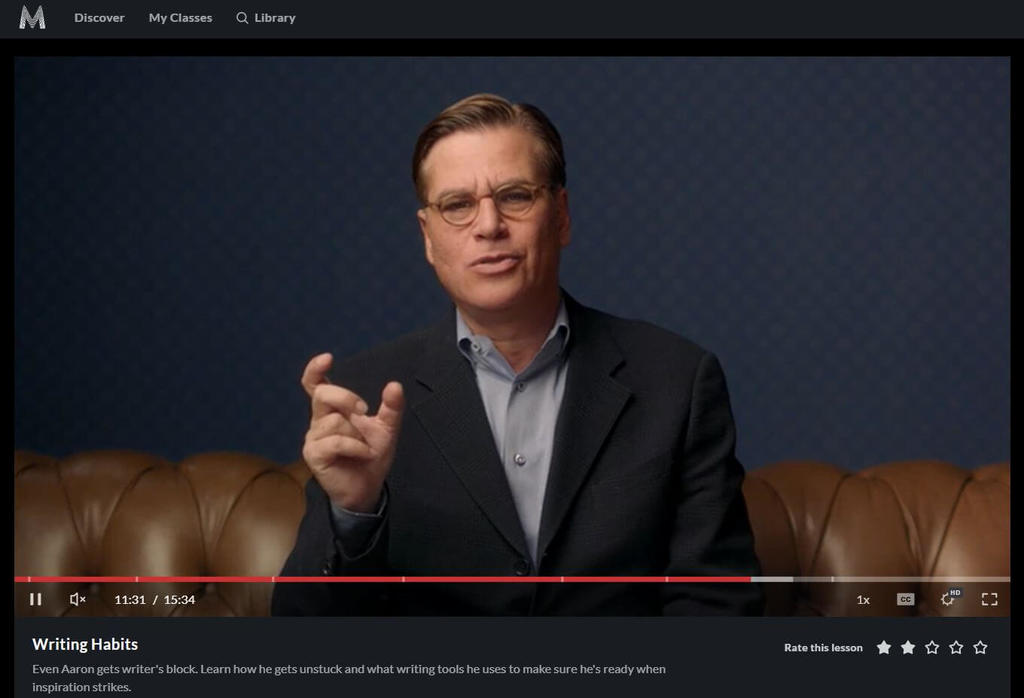
“But on the days you do write… and write something good… you feel like you can fly.”.
Hint: he shares his cure for writer’s block in this lesson.
When Sorkin starts writing a script, he has to have the intention and obstacle already figured out… at least for the first scene.
That is his process.
Then he uses computer software to organize his writing process, citing that all writers need tools to keep organized. Focused.
Index cards on a corkboard work too.
“Thinking of it as walking through the dark with a flashlight… only put on the board where you can see the story going at that point.”.
Sorkin also encourages practice.
The more you write, the better and more comfortable you will become. You will settle into your voice.
Finally, focus on the progress you have made… rather than the progress you haven’t made.
Lesson: Writing Scenes Part 1 & Part 2
“If you’re not moving the story forward, you’re standing still… and the audience won’t stay with you.”
You may start out wanting to head north, and going that way… but you will likely veer off course and go northeast a bit. That’s ok. As long as you go from one point to the next, you’ve gone someplace.
Sorkin preaches that the end of every scene should jettison you into the next… whether it’s obvious or not. You need to create a feeling that you’re happy to be moving on.
You also need to reward your audience’s patience. If you make them wait through a multi-episode buildup, you must reward their patience with clarity… the “ah ha” moment.
When it comes to introducing comedy into your writing, “the best kind of joke is the one you don’t see coming. The one that was set up early and pays off late.”.
Finally, he stresses the importance of the opening scene… how it will set the entire tone of the movie.
He, personally, likes to start a scene mid-conversation.
However you go about it, you must clue the audience into what the character wants, more so than who they are. If your character wants nothing, they are probably just cluttering up your pages.
Lesson: Writing Captivating Dialogue
Dialogue is the least teachable part of writing. Not completely unteachable, but the most personal part of writing. Every writer will cross the finish line a different way.
Dialogue is Sorkin’s “thang”. It’s what he does best.
And he explains his process, without once insisting it must be done the same way in order to work; but, it works for him.
“Dialogue sounds like music to me and it must comply with many of the same rules as composing music. If you drop a syllable, add one… pause… stutter… gets too loud. The music changes. It has allegros. Crescendos. Dialogue is music when done right.”.
In fact, Sorkin gives so much weight to dialogue that the course starts with flashes of dialogue and voice overs from some of his most famous movies and television programs. Without a doubt, his movies are synonymous with some of the most popular one liners and quotes ever uttered in tv or film.
He attests that if someone ever says to you, “people don’t really talk that way,” they are dead wrong. Of course people talk that way. And improvisation is the best way to prove this.
He attributes his success to having no interest in imitating how people really speak.
Lesson: Rewrites – First Draft
Rewrites aren’t a sign of a bad script.
In fact, Sorkin encourages you to put the thoughts in your head down before trying to change anything. Also not start over too soon. “Just get it down and then go back to rework the shapeless monstrosity you’re putting together.”.
Getting to the end will help you to better see the entire picture and play off what works, while dumping what doesn’t.
He also uses the phrase, “Killing your Darlings”. If a story works without something in it, lose it. If you can tell the story without that particular piece of information or that character, then they are not necessary.
Lesson: Rewrites – Notes
A successful rewrite is all about having a great supporting cast around you to give notes.
Sorkin says collecting the right script editors is key. Over time, you will develop a few relationships whose opinions and insights you value and respect.
But be careful who you listen to as well. They must understand the way you write… not the way they would write it.
Always listen if someone offers criticism… not to necessarily do what they say, but because they are pointing out a problem. A problem that stood in the way of them getting the most out of what you were trying to say. It’s your job to figure out what that is.
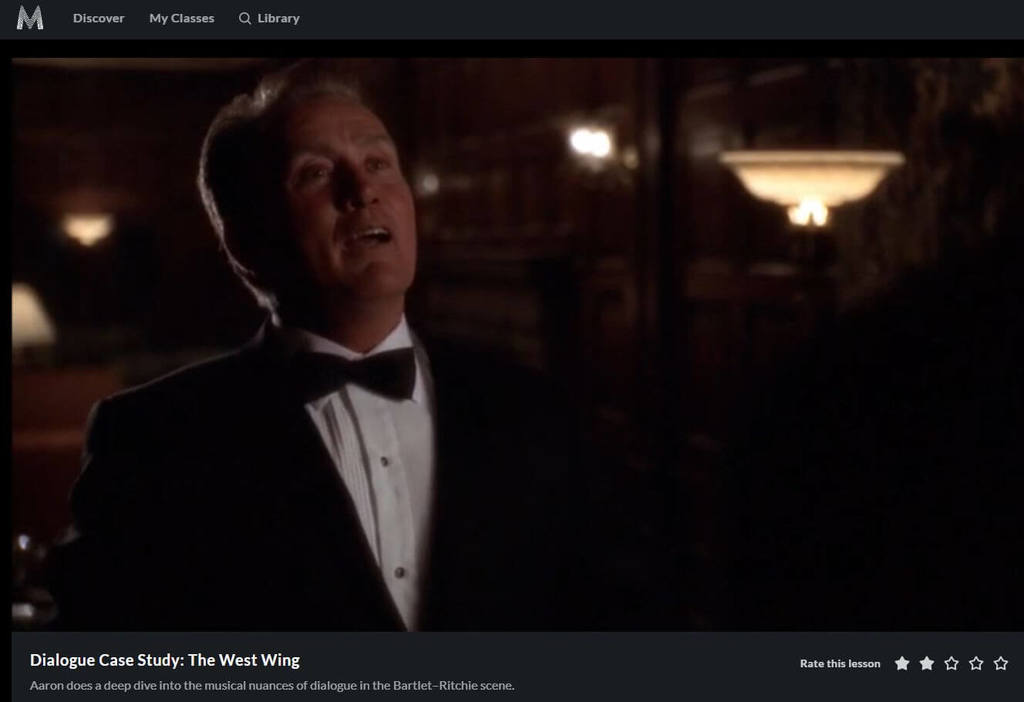
Lesson: Group Workshops & The West Wing Writers Room, etc.
Sorkin’s course includes quite a few of these table reads with a handful of aspiring writers.
They offer read alouds with discussions and feedback.
I found these rather interesting, as they teach more about the writing and brainstorm process than the stories Sorkin tells and tips he offers in his other course sections.
He is supportive of the work these people are doing. Assures them of their talent.
He is a mentor who can admit to his own shortcomings.
And he is humble, telling them, “I’m not sure anything I say to you will need to be written down.” The students laugh.
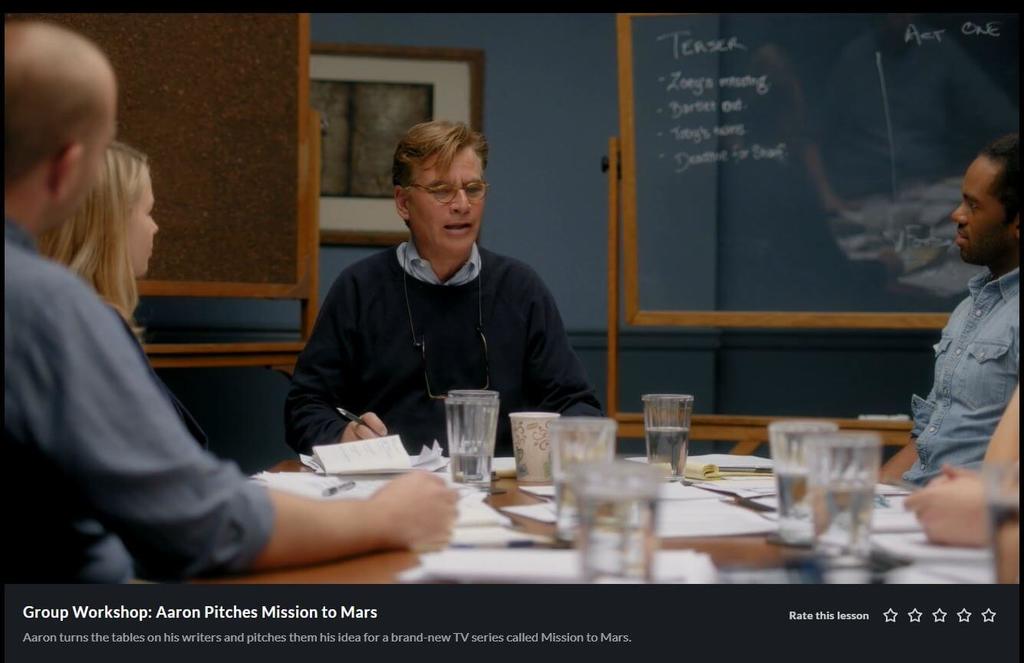
Perhaps the greatest lesson taught here is that dialogue and action should take as long as it would actually take to happen on screen, in life.
Lesson: Scene Case Studies & Pitch Sessions
Sorkin offers a fair amount of scene case studies in his class.
Their purpose is to break apart some of his most famous scenes and explain the intention and obstacle. His thought process and character arcs, as well as the relationship between them.
The West Wing and Steve Jobs are two case studies.
He also gives tips on how to pitch a story to Hollywood, as well as delivers an example pitch of his own to his group participants for a television series, “Mission to Mars”. A workplace drama set on Mars, about science and relationships… not space.
This was basically him talking from his subconscious to a roomful of up and coming writers. Not his best pitch, but entertaining.
Truth be told, you could likely skip this lesson and still find the course worth watching.
Final Thoughts on Aaron Sorkin’s Masterclass
In this Aaron Sorkin masterclass review, I’ve outlined his 15+ primary lessons, offering some quotes and advice I thought were worth highlighting.
To be honest, I had to cut over 1,000 words from this article… and could have written more, but then you wouldn’t have anything to look forward to.
I’m just kidding.
The truth is, Sorkin’s Masterclass is a must watch for aspiring writers.
The course starts off a bit awkward. He is awkward… but that is typically a sign of one’s genius.
And that fact that he is aware of this makes him tangible, and somewhat relatable, to his students. “When I am speaking out loud instead of writing, I tend to swerve all over the road… my apologies in advance for that,” he says.
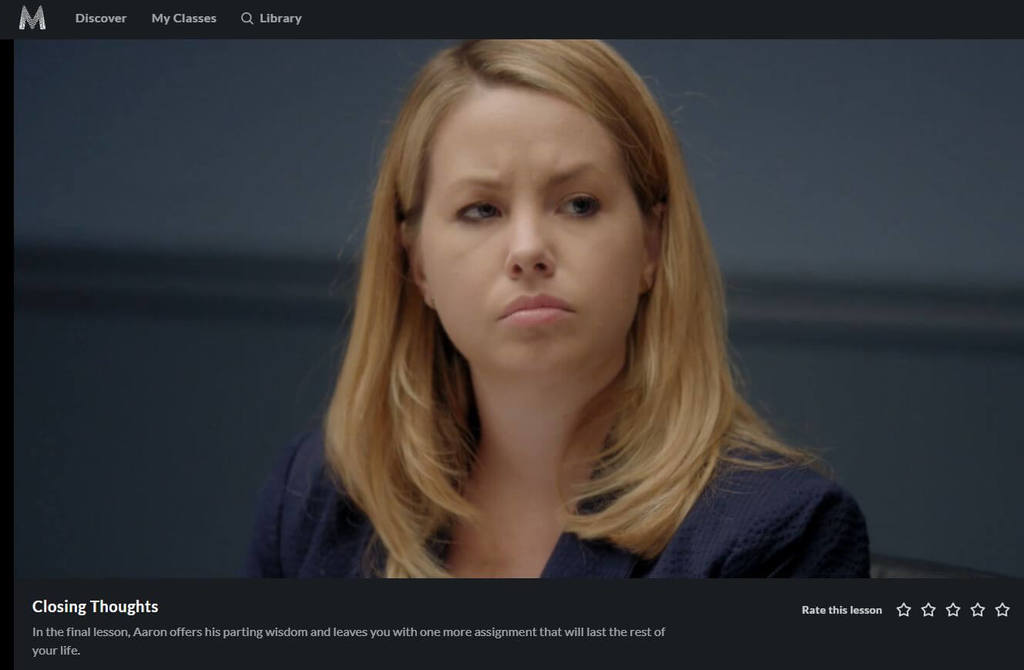
Sorkin has so many interesting things to say, I found myself constantly typing. But it’s not just what he has to say, it’s how he says it.
It promotes thinking and self-reflection.
It is not at all condescending. In fact, I found him inspiring.
His top-rated lessons on Masterclass are those that dealt with his specific writing process, as if people wanted to emulate it.
For me, however, they were more about letting the writer feel like there was no wrong process. And that the right process is the one that works for you. Every writer gets blocked.
Generally speaking, I felt that Sorkin was most in his element when brainstorming ideas with a room full of writers or deconstructing his own writing.
Writing is truly his craft and he is still trying to perfect it, despite his success.
Sorkin has a lot of good information to share. And while his teaching style can come off as a bit dry and long winded at times, it’s worth overlooking for what you have to gain.
I promise that anyone who finishes Aaron Sorkin’s Masterclass will improve their writing. “And unlike athletes, writers get better with age.”.
He concludes the course by saying that writers have to get used to criticism, but should never try and write to change someone’s mind.
While it’s ok at first to do whatever it takes to get your foot in the door to become a professional writer, you should never stop working on your own projects or abandon your vision.
“Most of your time will be spent not writing and it will be agony… but when you write that one perfect scene on screen, landing with an audience, you will feel no pain.”
If you still aren’t convinced that the Aaron Sorkin Masterclass is for you, then you can get access to this course and more on this page.

Nicole Krause has been writing both personally and professionally for over 20 years. She holds a dual B.A. in English and Film Studies. Her work has appeared in some of the country’s top publications, major news outlets, online publications, and blogs. As a happily married (and extremely busy) mother of four… her articles primarily focus on parenting, marriage, family, finance, organization, and product reviews.
